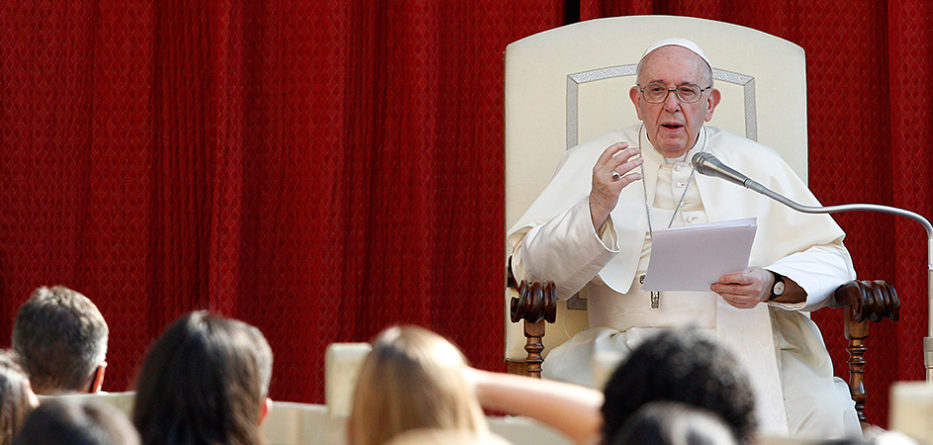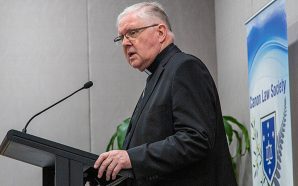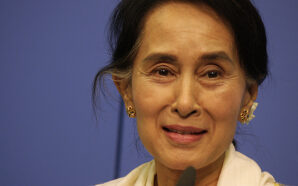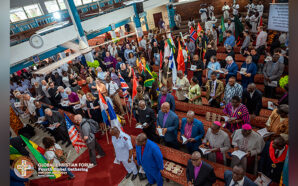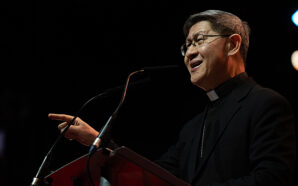Fr Satish Joseph gives us a rundown of why Pope Francis’ new encyclical Fratelli tutti comes at a time when we need to focus on the good of all peoples.
Fratelli tutti is a signature encyclical – not only of Francis’ papacy, but for the Catholic Church. During a pandemic, when the world seems to be at a political, social, religious and ecological tipping point, comes a papal encyclical on ‘fraternity’ and ‘social friendship.’
I am calling Fratelli tutti Pope Francis’ love letter to the world.
This long and complex encyclical consists of eight chapters and 287 paragraphs. The primary approach of this reflection is pastoral and is written for the Sunday pulpit. My focus is to introduce only the main teachings of the encyclical and draw out its implications.
I want to begin my reflection with an observation. I realise there are areas in our lives where the abnormal has become normal, and the normal, abnormal. For example, in our grocery stores today, we can find almost every fruit and vegetable in every season. This is not normal. But our consumerism has made the abnormal normal. Ecologically, and for the local populations from where these products are sourced, the cost is immense. But there is no going back to normal because the abnormal has become normal. When we read Fratelli tutti, we might have a similar experience. We find ourselves so far away from the quintessential Catholic theology, a Catholic worldview and from a Catholic Gospel ethic, that Fratelli tutti may sound strange, or to use my description, abnormal.
I have heard critics saying that Fratelli tutti edges on socialism, or even communism; that Fratelli tutti is bereft of theological insights, and that it lacks continuity with traditional Catholic teaching. Unfortunately, it has become so normal for many American Catholics to approach the Catholic faith from their political and ideological framework that normal Catholic social teaching sounds abnormal. I want to invite you to understand Fratelli tutti as quintessential Catholic social teaching.
With this in mind, I would like to lay out the basic tenets of Fratelli tutti. I am doing so under three headings: the common good at the centre; the Gospel at the centre; and, the human person at the centre.
The common good at the centre
Pope Francis begins Fratelli tutti with an assessment of the world. The assessment is comprehensive but unflattering. Pope Francis uses the word ‘common’ frequently, as in ‘our common home’ in reference to care for creation, and ‘the common good’ in reference to the care of all human persons. The standard by which he evaluates the global reality is through the lens of ‘the common good.’ The Catechism of the Catholic Church defines “common good” as, “the sum total of social conditions which allow people, either as groups or as individuals, to reach their fulfilment more fully and more easily” (CCC 1906).
Thus, Fratelli tutti says, “God has created all human being with equal rights, duties, and dignity, and has called them to live together as brothers and sister” (FT 5). And again, “When the dignity of the human person is respected, and his or her rights recognised and guaranteed, creativity and interdependence thrive, and the creativity of the human personality is released through actions that further the common good” (FT 22). This is the opposite of societies where often a privileged few determine what is best, create laws and systems that serve them, and create a morality that serves their vested interests.
Pope Francis’ focus is on the good of all peoples, particularly the large number of the powerless, those on the periphery, the ignored and the forgotten of the world. He addresses the problems ranging from nationalism to the throwaway culture of a throwaway world; from populism to hunger and trafficking; from insufficient universal human rights to flawed globalisation; from migration to the inability to carefully listen to each other.
The basic verdict in Pope Francis’ assessment is that the world has serious problems, and that these problems are created on two levels. The first level is the lack of respect for the human rights and dignity of all persons and cultures. The second is the intentional and selfish exploitation of people, cultures, laws, technology and systems by those who wield power and authority. This includes people with vested interests and those who are guided by ideologies.
Despite these dark clouds, Pope Francis promises to take up and discuss many “new paths of hope” (FT 54) for our “wounded world” (FT 67). Pope Francis invites us to dream. He says, “Let us dream, then, as a single human family, as fellow travellers sharing the same flesh, as children of the same earth which is our common home, each of us bringing the richness of his or her beliefs and convictions, each of us with his or her own voice, brothers and sisters all” (FT 8).
The Gospel at the centre
As is typical of Pope Francis, the Gospel of Jesus Christ is at the centre of Fratelli tutti. In particular, he uses the Parable of the Good Samaritan to propose a solution for our wounded world. Pope Francis gives numerous reasons for making the Good Samaritan the hero of his encyclical. It would be impossible to include them all here. However, let me point out a few.
First, Pope Francis says that this parable answers Genesis’ age-old question, “Am I my brother’s keeper?”
Jesus was asked a similar question thousands of years later “And who is my neighbour?” The Parable of the Good Samaritan and his love-centred action is the Pope’s answer to these questions (FT 57). Second, the most valuable point of the story is that ‘the Samaritan became a neighbour to the wounded Judean. To do so, the Samaritan had to cross all cultural and historical barriers’ (FT 81). Pope Francis says, “Jesus trusts in the best of the human spirit; with the Parable [of the Good Samaritan], he encourages us to persevere in love, to restore the dignity of the suffering, and to build a society worthy of the name” (FT 71).
Finally, as Pope Francis says, “This encounter of mercy between a Samaritan and a Jew is highly provocative; it leaves no room for ideological manipulation and challenges us to expand our frontiers. It gives a universal dimension to our call to love, one that transcends all prejudices, historical and cultural barriers, all petty interests” (FT 83). So, in the end, Pope Francis calls for a humanism inspired by faith as the foundation for a better world. Holding up the image of the Good Samaritan he invites us to teach and preach about “the social meaning of existence, the fraternal dimension of spirituality, our conviction about the inalienable dignity of each person, and our reasons for loving and accepting all our brothers and sisters” (FT 86).
The human person at the centre
I said in my previous point that Pope Francis proposes “Faith, and the humanism it inspires” as the foundation for future action. In a strict sense, humanism proposes human solutions to human problems without any reference to God or religious beliefs. In fact, some critics of Pope Francis have labelled him a humanist in this atheistic sense. Yet, Pope Francis is not afraid to use the word “humanism”, because unlike atheistic humanism, Pope Francis bases his humanism on the Gospel and the example of Jesus Christ. For example, Jesus’ statement, “The Sabbath was made for man, not man for the Sabbath” (Mark 2:27-28) puts the human person right at the centre of his ministry. The Good Samaritan too could be called a humanist, in that he disregarded all cultural, historical and religious boundaries and put a wounded and helpless person in the centre. It was an act of selfless and outgoing love.
The Parable of the Good Samaritan ends with Jesus saying to the lawyer, “Go and do likewise.” (FT 81). Here I want to quote my favourite quote from Fratelli tutti “All of us, as believers, need to recognise that love takes first place. Love must never be put at risk, and the greatest danger lies in failing to love” (FT 92). Pope Francis says that it is love, Gospel love, “that impels us towards universal communion” (FT 95).
Reflecting on “Go and do likewise,” Pope Francis places a special responsibility on families as the “first place where the values of love and fraternity, togetherness and sharing, concern and care for other are lived out and handed on” (FT 114). Pope Francis believes that such a world cannot happen without the dialogue, which is accomplished through consensus building, mutual respect and truthful discussions. Towards the same end, Pope Francis places great emphasis on “recovering kindness” (FT 222-224). Kindness – as described by Paul in Galatians 5:22 – Pope Francis says, “opens new paths where hostility and conflict would burn all bridges” (FT 224).
There are three things that are essential if we want dialogue, and ultimately peace and reconciliation: truth, justice and mercy. Here again, Pope Francis’ humanism comes to the fore. Peace would require, he says, “to place at the centre of all political, social and economic activity the human person, who enjoys the highest dignity, and respect for the common good” (FT 232). To accomplish this, truth, justice and mercy are uncompromisable.
In the very last chapter, Pope Francis assigns a special role to religion. He believes that all religions, “based on their respect for each human person as a creature called to be a child of God, contribute significantly to building human fraternity and defending justice in society” (FT 271). While religion can become a tool for violence and terrorism in hands of unconscionable people, he invites people of all religions to return to that which is basic to all faith traditions “worship of God and love for our neighbour” (FT 282).
In these words, Pope Francis finds the hope and the solution to the problems of our wounded world. Hope lies – as he lays out in the beginning – in rebuilding a society of fraternity and social friendship; in humanism inspired by faith (FT 86), and in love, truth, justice and mercy.
In this way, in the name of God, in the name of innocent human life, in the name of the poor, destitute and marginalised, in the name of orphans, widows, and refugees, in the name of all victims of wars, persecutions, and injustice, in the name of the weak, those who live in fear, prisoners of war and those tortured in any part of the world, in the name of peoples who have lost their security, in the name of human fraternity, in the name of freedom, in the name of justice and mercy, in the name of persons of goodwill, and in the name of God, Pope Francis ends his masterpiece encyclical, Fratelli tutti.
I would like to end with Pope Francis’ Ecumenical Christian Prayer that ends the encyclical:
O God, Trinity of love,
from the profound communion of your divine life,
pour out upon us a torrent of fraternal love.
Grant us the love reflected in the actions of Jesus,
in his family of Nazareth,
and in the early Christian community.
Grant that we Christians may live the Gospel,
discovering Christ in each human being,
recognising him crucified
in the sufferings of the abandoned
and forgotten of our world,
and risen in each brother or sister
who makes a new start.
Come, Holy Spirit, show us your beauty,
reflected in all the peoples of the earth,
so that we may discover anew
that all are important and all are necessary,
different faces of the one humanity
that God so loves.
Amen.
Fr Satish Joseph is the pastor of Immaculate Conception Church and St Helen’s Church in the Diocese of Dayton, Ohio. His homilies and reflections can be found at satishjoseph.com.
This article was first published on Where Peter Is.
This article was featured in the Summer 2020/2021 Edition of the Catholic Outlook Magazine.




